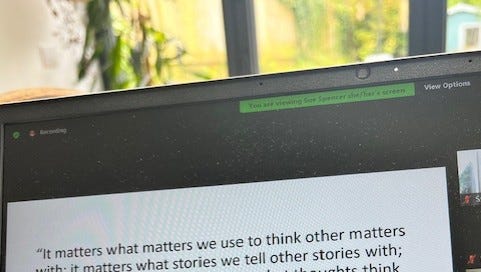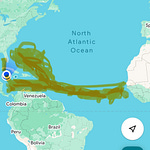I met up with some friends this week for a ‘game’ of pickleball. Last week’s post reminded me of the different meaning words can have, and how attached we can become to these, despite them depending so much on contexts and the imaginings of our mind. The quotations are an invitation to interpret the word game very loosely. We are learning how to play, so our version of a game may not resemble that of a seasoned player. Regardless, we had fun, which in my opinion is the main point of a game, and we rounded the evening off with dinner and conversation. The discussion planted a seed of a question in my mind of how we judge success.
It is not always obvious what seeds are going to grow into, and so it is with this week’s offerings.
It’s 12pm and I’ve spent my whole morning tackling the especially chewy topic of autism as we near the end of autism awareness month.
I was reflecting on the fact that I’ve have had a lot of articles coming up in my social media feeds with autism featured. Looking back, this is probably because there have been multiple awareness campaigns back to back, and possibly a function of myopic algorithms that see that I click on these articles, and share more.
Neurodiversity Week- March 17 - 23
World Autism Day- 2nd April
Autism Awareness month- April
What impact does this coverage have, I wonder. Are we more aware?
Perhaps of the term, autism, but awareness implies knowledge, and understanding, and I’m concerned that there are so many perspectives peppered with misinformation, that it is nigh on impossible to navigate as someone with some experience and expertise in the field, let alone for more neutral observers. What do we make of it all?
Looking in on myself, do I feel more aware at the end of this month, or more conflicted? Is it of course possible to be both, and I found it helpful to imagine it as threads, or clusters of threads that have become so knotted it is difficult to understand it all. I’m finding it more difficult to see where one begins and another ends. What are the facts, what are opinions; sometimes it is difficult to tell the difference.
I wanted to explore some of the themes and the challenges;
The question of over-diagnosis vs better recognition.
Positions on and implications of terminology -
pathology vs appreciation of diversity- disorder, impairment, human condition, diversity, difference, spectrum, disability.
Political representative’s use of language and misinformation- deliberate or incompetence?
The autism health registry- fears and facts.
Who has the power to diagnose?
Needs vs diagnoses.
Ensuring the needs of non-verbal autistics and those with intellectual disabilities are still heard amongst the self-advocacy and unmasking movement.
I’m trying to stick with it but for Substack I’ve accepted defeat- It’s too big to handle in the way I hoped. I’d like to take one thread, but I am not good at looking at one thing at a time, I like to make sense of the whole, and how one part links to another. The ideas are so tangled that pulling at one thread tightens something in a deeper section of the knot. I have to move on to that, figuring out by looking and pulling, what might make that part a little looser? Each theme is debated, and linked to research findings, identity politics, experience, service, and financial and political implications. There are so many threads, and nothing seems to be getting looser.
I step back and ask myself- Do I give up and walk away, or can I stay with the discomfort and just keep gently pulling, trusting that each time there is a loosening, and a learning about what part I need to nudge on next?
Some people can do this untangling in their minds, and for others this kind of knotty subject is best loosened in conversation. I am the latter, but only when it’s with others who want to understand the different threads. It’s not good when one of the people pulls at one thread and says this is the answer, or who sees the knot and gets a knife to cut straight through. The knot will be undone, and some of the threads will be free, but at a cost.
If I’m honest with myself, I am not expert or clever enough to unravel all these knots myself to present a coherent explanation of the issues at hand. But I want to post something to acknowledge that I am trying, and that it is important for us to continue thinking, and making sense, and asking questions. But most important is to remember that whilst we debate and unravel, each thread has implications for the lives lived and stories told about autism. The language we use, the research we privilege has a big impact.
At the heart of this debate are people.
Quotation from a presentation by Sue Spencer for Lapidus, 3rd August 2024.
Language matters
The language and debates have real world consequences. Read this headline, on the official website of the US government-
‘Autism Epidemic Runs Rampant,’ New Data Shows 1 in 31 Children Afflicted | HHS.gov
Without even reading the content, you get a flavour of the narrative that is being created. I can understand the anxiety that I see written about in articles in the past week. The fear, unfounded or not, of proposals of a register of autistic people, for what purpose? Research, they say. Better understanding.
Yet, this is what the people proposing the register also have to say;
“The autism epidemic has now reached a scale unprecedented in human history because it affects the young,” said US Health and Human Services (HHS) Secretary Robert F. Kennedy, Jr.
“The risks and costs of this crisis are a thousand times more threatening to our country than COVID-19. Autism is preventable and it is unforgivable that we have not yet identified the underlying causes. We should have had these answers 20 years ago.”
What nonsense.
The crisis?
“The autism epidemic is running rampant,
And the US Secretary Kennedy intends to find the
'“root causes of the childhood chronic disease epidemic -- including autism,”
He goes on to announce that
“We are assembling teams of world-class scientists to focus research on the origins of the epidemic, and we expect to begin to have answers by September.”
Where are we now? The end of April. Assuming there are world class scientists twiddling their thumbs waiting for a call to such an important research project, that gives them 5 months to find these answers. Anyone who has ever conducted a research project knows the ridiculousness of this claim even for a small project, let alone a question that uses the term epidemic, and identifies autism as a ‘disease’ that is going ‘rampant’.
These statements remind me of my utter disbelief when watching the unfiltered arrogance and hero-complex embedded in the 1996 American movie Independence Day. After the world struggled to defeat the aliens, relief suddenly came at the announcement- ‘The American’s are coming’. Yes, and why didn’t we bring them in sooner to solve this ‘knotty problem’ of autism.
Misinformation aside, part of the issue here is trust. When they collect all this data will the decisions be made by people with the understanding and expertise required?
The defeat and conquer tropes are troubling. They have no place here. Autism is not an disease to be eradicated. Awareness is surely about understanding and removing barriers, making life better, not swooping in as if people are a threat to be eradicated. It is a tricky enough place to navigate without all this false information and ego.
The knot is being pulled by many fingers with different political, financial, and human goals. So many people have skin in the game. I know I do. But I want to better understand the knot, rather than wield a knife to cut through it.
I ask myself the questions again-
As we reach the end of autism awareness month do I feel more aware of autism, and the best ways to support people, or more conflicted?
Yes. No.
So, what next?













Share this post